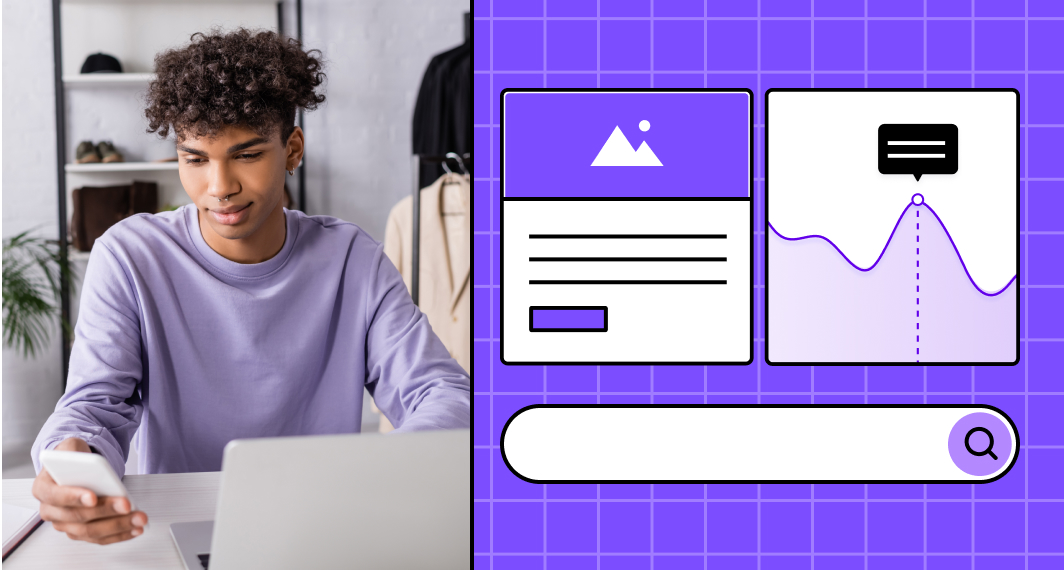What is an online marketplace?
Online marketplaces are a type of online selling platform where you can sell a range of products or services to a wide audience. Essentially, they’re virtual shopping malls that allow businesses to list their offerings and customers can browse, compare and make purchases from various sellers.
These marketplaces often provide a secure environment for transactions and offer a wide range of goods, making it convenient for your customers to find what they need.
What are the types of online marketplaces?
There are many types of marketplaces depending on various use cases 👇
1 - B2C (business-to-consumer) marketplaces
In this marketplace, consumers can purchase products or services directly from your business. For example, you can sell your products on platforms like Amazon marketplace and Walmart, where online shoppers can buy items from you.
2 - C2C (consumer-to-consumer) marketplaces
Here, individuals can sell items online to other individuals. Platforms like eBay and Craigslist facilitate these transactions, allowing people to list their used items for sale.
3 - B2B (business-to-business) marketplaces
These marketplaces are designed for businesses to trade with other businesses. As a business owner, you can easily source supplies or services, often in bulk, from platforms like Alibaba or ThomasNet.
4 - P2P (peer-to-peer) marketplaces
P2P is a type of marketplace where you can share or rent assets or services directly with other individuals. Examples include Airbnb for accommodation or Turo for car rentals.
5 - Service-based marketplaces
These platforms connect individuals with service providers. Websites like Upwork and Fiverr help people find freelancers for various tasks like graphic design and content writing.
Pros and cons of online marketplaces
There are many reasons why you should and shouldn’t list your business on online marketplaces. Some of the reasons are:
Pros | Cons |
Access to a large customer base | Marketplace commission fees |
Built-in payment systems | Intense competition |
Increased visibility | Decreased branding |
Trust and reputation | Limited control |
Easy setup | Delays in payments |
Pros of online marketplaces
1 - Access to a large customer base
As a business, you benefit from online marketplaces' extensive user base, providing you with access to a vast pool of potential customers without the need for extensive marketing efforts.
2 - Built-in payment systems
With online marketplaces, you can take advantage of their secure payment processing systems. Buyers trust the payment process of marketplaces and you receive payments directly through the online platform, simplifying your financial transactions.
3 - Increased visibility
Your products gain more visibility on well-known online marketplaces, where shoppers are more likely to discover and trust items listed on established platforms.
4 - Trust and reputation
Leveraging the marketplace's reputation for reliability and trustworthiness can enhance your credibility as a seller. This trust can lead to increased sales and improved customer retention.
5 - Easy setup
Many online marketplaces offer user-friendly interfaces and straightforward store setup processes. This simplifies the process of listing your product categories and getting started, even if you're new to online selling.
Cons of online marketplaces
1 - Marketplace fees and commissions
Online marketplaces typically impose various fees, including listing fees, transaction fees and commissions on sales, otherwise known as revenue sharing. These fees can eat into your profit margins, especially for lower-priced items.
2 - Intense competition
On popular online marketplaces, you'll face fierce competition from numerous sellers offering a similar variety of products. Selling at competitive prices to gain market share can be challenging, particularly if you’re a new seller.
3 - Limited branding
Online marketplaces often prioritise their branding over individual seller brands. This may limit your opportunities to showecase your unique identity compared to having your standalone website or app.
4 - Limited control
You might encounter limitations on your control over branding, customisation and customer communication while operating within an online marketplace. This is because you have to adhere to the platform's guidelines and policies.
5 - Delays in payments
Payment cycles of online marketplaces can sometimes take between 14-28 days. Once your customers purchase your goods, the marketplace receives the funds and deducts their fees first before transferring the remainder to you. Stopping the seamless flow of funds can result in serious problems with your business's financial processes.
Use our online marketplace builder 👈 to create your own or 👉 talk to our product experts about your marketplace idea!
Get a free app prototype now!
Bring your software to life in under 10 mins. Zero commitments.


 Facebook
Facebook X
X LinkedIn
LinkedIn YouTube
YouTube Instagram
Instagram RSS
RSS


